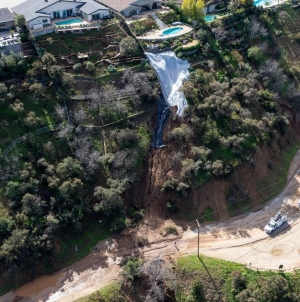-
Gazans Drown Trying to Retrieve Aid From Sea, Authorities Say - March 26, 2024
-
A portion of Mulholland Drive, damaged by mudslides in winter storms, reopens - May 26, 2024
-
‘Maybe You Don’t Want to Win’ - May 26, 2024
-
Donald Trump Putting Law Enforcement in Danger: Attorney - May 25, 2024
-
Avoid the waters of these 5 L.A. County beaches this holiday weekend, public health officials say - May 25, 2024
-
Bawdy Comedy ‘Anora’ Wins Palme d’Or at Cannes Film Festival - May 25, 2024
-
Map Shows Heat Wave Zone Spread Into Five New States - May 25, 2024
-
Azusa police arrest suspected slingshot-wielding vandal - May 25, 2024
-
Donald Trump Hammers Judge Ahead of Jury Instructions - May 25, 2024
-
Sometimes U.S. and U.K. Politics Seem in Lock Step. Not This Year. - May 25, 2024
Gazans Drown Trying to Retrieve Aid From Sea, Authorities Say
The authorities in Gaza said on Tuesday that several people had drowned while trying to retrieve airdropped aid that had fallen into the Mediterranean, the latest incident in which an airdrop has apparently led to deaths. They called for an end to airdrops over the territory and an increase in deliveries by land.
People waded into the water from a beach in northern Gaza on Monday afternoon to get the aid packages, according to Ahmed Abu Qamar, a Gazan-based researcher for EuroMed Rights, a human rights group, who said he had spoken to witnesses. Around a dozen people drowned, including at least one who had become entangled in a parachute, he said. Others were taken to a nearby hospital.
The government media office in Gaza issued a statement about the drownings, but it was not possible to confirm the details independently.
The United Nations and other aid organizations say that trucks, rather than planes, are the cheapest, safest and most effective means of delivering aid to Gaza, a territory whose population of more than two million faces a hunger crisis that humanitarian organizations say borders on famine.
But several governments, including those of the United States, France, Jordan and Egypt, have in recent weeks used airdrops to supplement aid that arrives by land, while also calling on Israel to allow in more trucks.
The airdrops are not without risk. The authorities in Gaza said earlier this month that at least five Palestinians had been killed and several others wounded when humanitarian aid fell on them in Gaza City.
It was not clear which country dropped the aid that landed in the sea on Monday, but the U.S. military’s Central Command said it had conducted an airdrop just after midday.
The United States “dropped over 46,000 U.S. meals ready to eat into northern Gaza, an area of great need, allowing for civilian access to the critical aid,” its statement said. “These airdrops are part of a sustained effort and we continue to plan follow-on aerial deliveries.”
A spokeswoman for Centcom on Tuesday declined to comment on the reports of deaths. Israeli officials did not immediately respond to a request for comment.
The British defense secretary, Grant Shapps, said on social media on Tuesday that his country had airdropped 10 tons of aid over Gaza, and he thanked Jordan for its help. The post gave no details of when or where the drop was made.
Governments say that the drops are necessary because of a steep fall in the amount of aid entering Gaza since Oct. 7, when Hamas led a deadly attack on Israel. The number of aid trucks entering Gaza since then has fallen by around 75 percent, according to U.N. data. One charity, World Central Kitchen, delivered a bargeload of aid to Gaza earlier this month.
Governments and aid groups say Israel has slowed aid deliveries through stringent inspections of trucks. The authorities in Israel blame UNRWA, the United Nations aid agency that supports Palestinians, arguing that Israel can inspect and process aid trucks faster than humanitarian groups can distribute the aid inside the territory.
Abu Bakr Bashir and Adam Sella contributed reporting.































